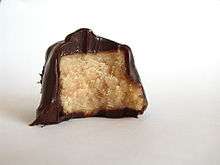semese
English
WOTD – 14 June 2010

A semese confection.
Etymology 1
From the Latin sēmēsus; from sēm- (“half-”) + ēsus (“eaten”), the perfect passive participle of edō (“I eat”).
Pronunciation
- (UK) enPR: sĭmēsʹ, IPA(key): /sɪˈmiːs/
Adjective
semese (not comparable)
- (rare) Half-eaten.
- 1859: Frederic William Farrar, Julian Home: A Tale of College Life, chapter VII: “The Scorn of Scorn”, page 89 (1866 publication)
- “Ha, ha, ha!” said Bruce. “No; they’re sons of gyps and that kind of thing, who feed on the semese fragments of the high table.”
- 1903 June 6, Dean Farrar as Headmaster, published in The Living Age, 7th series, volume XIX (from the beginning, volume CCXXXVII), number 3074:
- But what was my indignation, vexation and shame when I discovered them greedily engaged in ravenously devouring the semese fragments of a barbaric repast.
- 1859: Frederic William Farrar, Julian Home: A Tale of College Life, chapter VII: “The Scorn of Scorn”, page 89 (1866 publication)
References
- “seˈmese, a.” listed in the Oxford English Dictionary [2nd Ed.; 1989]
Etymology 2
Pronunciation
Noun
semese (plural semese)
- A member of the warrior caste of the Elema of Papua New Guinea.
- 2009: Arthur James Todd, The Primitive Family as an Educational Agency, page 208
- During this period they meet the semese or fighting men of the tribe, “from whom they receive every incentive to become warriors.” Finally there are certain endurance tests that each heapu must pass before he is considered eligible to become a semese. “Of these the most important tests are, chewing upe (the root of the ginger plant), and drinking the urine of the semese chief.” The wind-up of the whole affair is the feast at which the heapu at last becomes a full-fledged semese and is entrusted with its mysteries; but this mystery feast is really an anticlimax and frequently disappoints the candidates.
- 2009: Arthur James Todd, The Primitive Family as an Educational Agency, page 208
Translations
warrior amongst the Elema
This article is issued from
Wiktionary.
The text is licensed under Creative
Commons - Attribution - Sharealike.
Additional terms may apply for the media files.